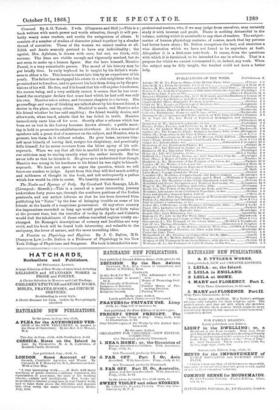Crowned. By A. G. Tainsh. 2 vols. (Chapman and Hall.)—This
is a book written with much power and worth attention, though it will pro- bably weary some readers, and excite the antagonism of others. It consists of a number of studies of character joined together by a slender thread of narrative. Those of the women we cannot realize at all. Edith and Annie scarcely pretend to have any individuality ; the egotist, Mrs. Aylsham, is drawn with care, but not, we think, with success. The lines are visible enough and vigorously marked, but do not seem to make up a human figure. But the hero himself, Maurice Pascal, is a very remarkable person. The moral of his history may be put briefly thus. In early boyhood he is taught by his father's weak- ness to abhor a lie. This lesson is burnt into him by an experience of his youth. The father has mortgaged his estate to a rich neighbour who has promised not to foreclose, and to prevent his heir from doing so by the pro- visions of his will. He dies, and it is found that his will enjoins foreclosure, the reason being, and a very unlikely reason it seems, that he has over- heard the mortgagor declare that some land which he had sold was still his own. Maurice takes orders, and becomes chaplain to a factory. His proceedings and ways of thinking are talked about by his dearest friend, a doctor in the place, among others. Mischief is made, and Maurice asks his friend whether he has said anything ; the friend weakly denies, and afterwards, when taxed, admits that he has failed in truth. Maurice immediately casts him off for ever. Shortly after a scheme which has been set on foot in the factory becomes known abroad; a public meet- ing is held to promote its establishment elsewhere. At this a number of speakers talk a great deal of nonsense on the subject, and Maurice, who is present, lots them do it without rebuke. He goes home, accuses him- self most bitterly of having lied, resigns his chaplaincy, and practically kills himself, for ho never recovers from the bitter agony of his self- reproach. When we say that all this is morbid it is very possible that our criticism may be stating exactly what the author intends. But he never tells us that he intends it. Ho gives us to understand that though Maurice was wrong in his hardness to his friend he was right in his self- reproach. We have not space to argue the question, which we will leave our readers to judge. Apart from this they will find much solidity and nobleness of thought in the book, and not unfrequently a pathos which few would be able to resist. We heartily recommend it.






























 Previous page
Previous page